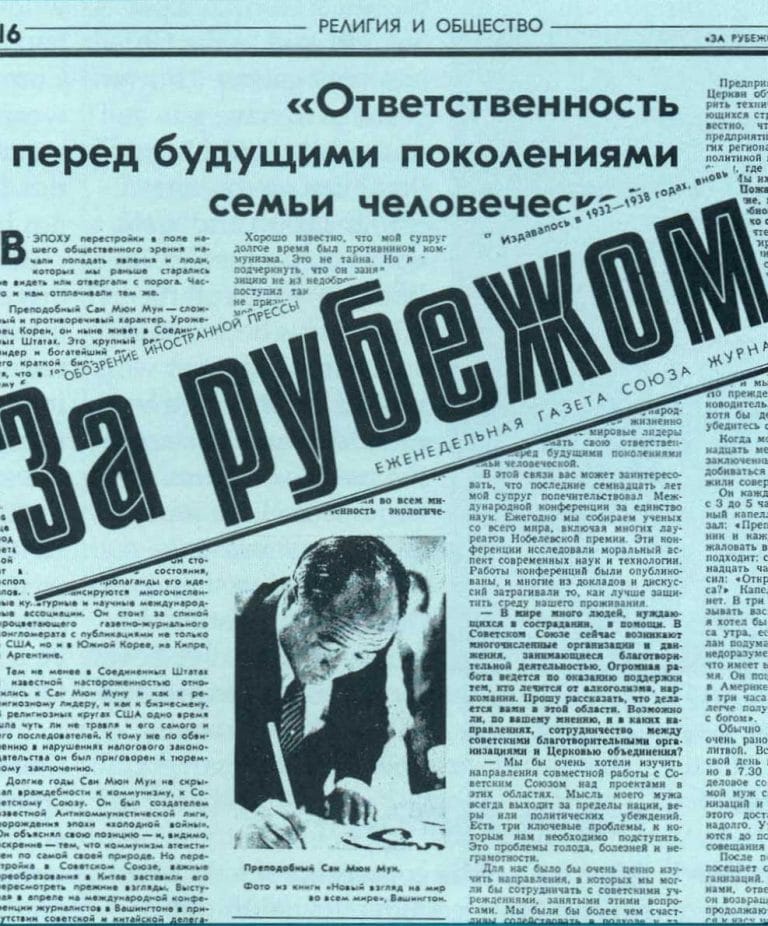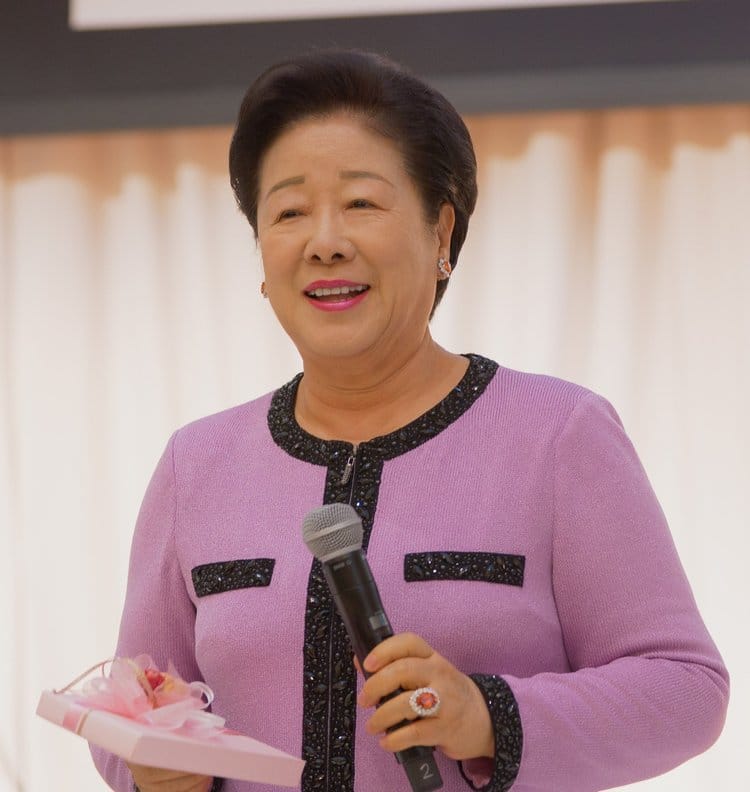November March 1989. Among the Soviet delegation was Vladimir Iordansky, editor of Za Rubezhom (Abroad) from Moscow. His weekly magazine has a circulation of 900,000 to a readership of Soviet intellectuals and elite.
Following the Opening Session of the Conference, at which Father delivered the Founder’s Address, Iordansky approached Executive Director Larry Moffitt, inquiring if he could interview Father for his magazine. When Larry forwarded the request to Father, he said that Mother would answer written questions about her husband, his work, and their family. Mr. Iordansky added biographical background and commentary for his Soviet readers, which, along with the translated interview, was published in Za Rubezhom issue no. 24 of 1989, pg. 16, in the Religion and Society section. Here is the interview as translated into English by Andrew Kessler.
In this era of perestroika, phenomena and people are coming into our social field of vision that before we tried not to see, or we rejected. Often we were repaid in kind. The Reverend Sun Myung Moon is a complex and contradictory figure. A native of Korea, he currently lives in the United States. He is a great religious leader and a wealthy industrialist. In his brief biography it is told that in 1935, on Easter morning, Jesus Christ appeared to him and prompted him to do religious work. After dramatic, vivid experiences, Sun Myung Moon founded and headed a new Christian movement, whose organizational name became the Unification Church.
Religious revelations occur quite frequently in certain social and cultural situations.
In 19th century Russia there was a small sect whose religious teachers proclaimed themselves to be the earthly incarnation of the spirit of Christ. In the character of Reverend Moon, what is most striking is the combination of deep religiosity and enterprising spirit. At present, he stands at the head of an enormous fortune which is used to propagate his ideals. He finances numerous international cultural and scientific associations. He stands behind a flourishing newspaper magazine conglomerate with publications not only in the United States, but in South Korea, Cyprus, and Argentina as well.
Nevertheless, in the United States, Sun Myung Moon has been treated with a well-known guardedness, both as a religious leader and as a businessman. At one time from religious circles in the United States, there seemed to come a steady stream of defamation, both of him and his followers. In keeping with this, on an accusation of violating tax laws he was sentenced to prison.
For many years Sun Myung Moon did not hide his animosity towards communism, towards the Soviet Union. He was the founder of the famous Anti-Communist League, a product of the “Cold War.” He explained his position, apparently sincerely, in that communism is atheistic by its very nature. But both perestroika in the Soviet Union and the important transformations in China compelled him to reconsider his previous views. Addressing an international conference of journalists in Washington, DC in April in the presence of Soviet and Chinese delegations he said: “The communist world is rapidly changing. I approve of the new policy of glasnost and perestroika in the Soviet Union and the reforms carried out in China. The media in both countries are playing a leading role in these changes.”

Reverend Moon doesn’t give interviews. But his wife and comrade-inarms, Hak Ja Han Moon, amiably agreed to answer several of my questions. We publish her answers with minor abbreviations. I think they shed light on what is one of the most unique and influential of the new religious movements, not only in the United States but on the approach of its spiritual leader to an entire host of important problems for all of humanity.
Q: The Unification Church is active in many countries of the world, and numbers hundreds of thousands of followers. Their concerns and dreams apparently find expression in the teachings of Reverend Moon. What goals does he advance?
A: When my husband approaches God in prayer, he doesn’t ask God for help, but asks what His Will is. And he pledges to fulfill it. According to my observation, when my husband sets out to work in this spirit, God helps him even without his asking.
I want to emphasize that racism, religious intolerance, the desecration of nature, and other misfortunes of our world are the result of serious problems in the human heart.
That’s where we should approach the solution of world problems. The hatred in the heart of men must be replaced with love.
It is well known that my husband was a longtime opponent of communism. This is no secret. But I want to emphasize that he didn’t hold this position out of malice. He held it because Marxism doesn’t recognize the existence of God. But my husband always believed in the grandeur of the Soviet Union. Today the West is falling into decline because of its callousness about God, and its abuse of human freedom.
When the nation of the Soviet Union carries out the reform of its system and religious freedoms are firmly restored, prosperity will undoubtedly come.
With God’s help, the future of the Soviet Union will be bright. You should strongly believe in your country. My husband asked me to say to you, may God bless you and your families, may God bless the people of the Soviet Union.
Q: In the present day there is a growing concern with ecological problems throughout the world. In the opinion of the Soviet Union, international cooperation is essential to save the world from ecological catastrophe. What is your opinion, the opinion of Reverend Moon concerning these problems?
A: Originally, nature itself maintained its balance, but when human beings are included in the equation, they destroy the balance of nature. In this century, humankind has achieved astonishing technical and scientific successes. The USSR created the Sputnik and was proud to call Yuri Gagarin its son. Just think also about the surprising breakthroughs accomplished in recent years in medicine, such as the polio vaccines of Salk and Sabin.
I believe that God is working through science as well so that we can understand the importance of having the greatest concern about the environment. Today we understand that many household items such as aerosol sprays can cause lasting damage to nature if they are not used with the necessary caution.
We also understand that we are going to have to cope with the consequences of the fact that we continue to produce an enormous quantity of waste that is unrecyclable and which are not biodegradable. The consequences of poor management in agriculture such as the destruction of huge rainforests, are becoming more and more obvious. And what’s more, from such catastrophes as Three Mile Island in the United States and Chornobyl, we see the absolute necessity of a more cautious approach to the peaceful development of nuclear energy.
I attended the 1988 Seoul Olympic Games. Two of our children were on the South Korean Olympic equestrian teams. What moved me about this event was the growing awareness of the importance of international cooperation. It is becoming more and more clear that no nation is an isolated island.
As international cooperation grows, it becomes possible in the sphere of ecology to accomplish worldwide agreement on the steps we must take for the defense of the conditions of life on our planet. The USSR is correct in opening up international cooperation in this vitally important area. All world leaders are obligated to recognize their responsibility before the future generation of the human family.
In this regard, it might interest you to know that for the past seventeen years, my husband has sponsored the International Conference on the Unity of the Sciences.
Every year we gather scientists from all over the world, including many Nobel laureates. These conferences research the moral aspects of science and technology.
The conference proceedings have been published, and many of the papers dealt with how to better defend our environment.
Q: There are many people in the world in need of compassion and help. In the Soviet Union today there are emerging numerous charitable organizations and movements. Great work is being conducted in giving support to those who are being treated for alcoholism and drug addiction. Could you tell us what you are doing in this area? In your opinion, is cooperation between Soviet charitable organizations and the Unification Church possible, and if so in what ways?
A: We would very much want to study the possibility of joint work with the Soviet Union on projects in these areas. My husband’s thought always transcends the limits of nations, religions, and political beliefs. There are three key problems we need to address. These are the problems of hunger, disease, and illiteracy.
For us, it would be very valuable to study the ways in which we could work together with the Soviet agencies that deal with these problems. We would be more than happy to cooperate in an approach to these problems, be it inside or outside the Soviet Union.
Let me give you an example of how we are approaching some of the problems which you mentioned. Above all, problems such as alcoholism and drug addiction, as well as immorality and family breakdown, stem from spiritual confusion and lack of self-control. If medicine and psychology are capable of only partially curing these problems, then we believe the churches must play an important role.
On an international scale, one of the most severe problems that our world faces is the scientific and technological gap between nations. Some of the most developed nations in the world are not sharing their scientific technological knowledge with less developed countries. This is an incorrect position. It is our duty to work together towards the creation of an international sphere of cooperation and prosperity. As long as the gap between poor and rich countries is maintained, the soil for conflict and war remains.
We have a permanent team of doctors and nurses who work on projects of medical assistance. In addition, we have assisted in the construction of schools and orphanages in developing countries. We are also helping the victims of natural disasters, and in particular, we assisted in the collection of aid for the victims of the tragic Armenian earthquake.
However, there are needy in the United States as well. In 1984 my husband acquired 250 ten-ton trucks and assigned five to be used in each of the 50 states. They are used mainly to deliver food products to the needy.
The businesses founded by members of the Unification Church are helping to hasten technical progress in developing countries. Perhaps you know that we have businesses in Africa, China, and other regions. In keeping with our policy, we don’t take out the profits from those countries where our enterprises are functioning, but rather we reinvest them.
Q: In conclusion, could you describe to us how Reverend Moon’s working day is structured? And perhaps a few words about your family?
A: My husband’s activity has attracted wide interest, but also onslaughts of hysteria in certain circles. The reason has been the distorted presentation about my husband in the media. Often when people meet Reverend Moon they expect to see a monster and are amazed to see what a loving and attentive person he is. Surely you were also surprised, having met him personally.
My husband is, all in one person, a fisherman and a businessman, a newspaper publisher and a thinker, as well as many other things. But above all, he is a religious leader. If you would spend even a day with him, you would immediately become convinced of this yourself.
When my husband was in prison for thirteen months in the United States, the other prisoners expected that he would try to get an easy life, but they discovered a completely different person. Every day he woke up and prayed from three to five o’clock in the morning. One day the prison chaplain came to him and said, “Reverend Moon, you are a minister and every Sunday you are welcome to use the chapel.
Which time would suit you: seven, nine, or even eleven o’clock a.m?
My husband asked, “Is the chapel open at three o’clock?” The chaplain replied, “No problem. I’ll call you at three o’clock in the afternoon.” My husband said, “No, I want to use it at three o’clock in the morning if it is possible.” The chaplain thought perhaps there was some sort of misunderstanding, but my husband made it clear that he meant the morning.
He joked, “I doubt that in America there are many people who pray at three in the morning, so therefore it will be easier for me to get a direct line to God.”
Usually, my husband gets up very early, beginning his day with a long prayer. After that, he plans his day and greets the children. Breakfast starts exactly at 7:30. It’s also a working session. In the United States alone, my husband created more than three hundred organizations and businesses. You see, that’s enough to occupy him for a long time.
The morning meetings continue into the afternoon. At lunch, the working sessions don’t stop.
After midday, my husband usually visits one of the organizations he founded.
There he chats with its member and answers their questions. He returns home for dinner. At dinner the meetings continue, finishing up about one o’clock in the morning. My husband is almost 70 years old. He leads a very disciplined way of life. If you’re by his side for a few days you discover that he is constantly loading himself down with work.
We have twelve children: six daughters and six sons. Already more than half of our children have their own families. Our oldest child, a daughter, is 28, and our youngest, also a girl, will soon be seven. It’s not simple to be the mother of so many children. And now there are grandchildren. Seven of them already!
We believe that the family is the only institution created by God Himself.
Sometimes we speak of it as a school of love, a place where we learn to relate to all human beings. We also believe that the family is the building block of the Kingdom of Heaven on earth.
The interview concludes. Entirely new, often foreign, and unusual notions. But our time is a time of tolerance, a time of respect for another person, moreover of religious views; this is a deeply personal question of conscience. Such tolerance, personal and social, opens up possibilities today for cooperation in practical affairs.
This is important. Surely conceptions of new thought propose the joint action of all the forces of humanity that strive to rid the world of its old ashes of hunger, economic backwardness, epidemics, and the newer ecological, military, and nuclear dangers that loom over it.




